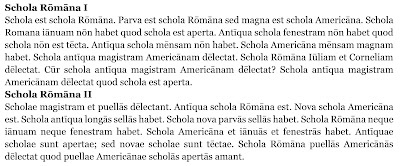Schola Rōmāna I
Exercise [1]
- Quālis est schola Rōmāna?
- Quālis est schola Americāna?
- Cūr schola Rōmāna iānuam nōn habet? [cūr = why?]
- Cūr scholā antīquā fenestram nōn habet?
- Quid schola Americāna habet?
- Quālem mēnsam schola Americāna habet? [quālem = what kind of?]
- Quem schola antīqua dēlectat? [quem = whom?]
- Quem schola Rōmāna dēlectat?
- Cūr schola antīqua magistram Americānam dēlectat?
- Cūr schola antīqua puellam Rōmānam dēlectat?
Notes: Notes: Schola Rōmāna I
In the sentence Schola
Rōmāna iānuam nōn habet, what is the subject? Are the words schola
and iānuam in this sentence used in the same way? How is iānuam used?
In the English
sentence, He strikes the ball, ball is said to receive the action
of the verb strikes. In the same way in the sentence He has the ball
or He admires the ball, we say that ball receives the action of
the verbs has and admires. In all of these sentences he is
the subject of the verb and ball is the direct object,
often simply called the object of the verb.
When we see an
expression like he strikes or he praises, we think at once what
does he strike? or whom does he praise? Such verbs, which
need a direct object to make the sentence complete are called transitive verbs.
But not all verbs are transitive. Sentences like he smiles or I agree
are complete without a direct object. Such verbs are called intransitive
verbs.
In the Latin
sentence quoted above Schola Rōmāna iānuam nōn habet, the word iānuam
is the direct object of habet. Find other direct objects in the story.
What endings does each of these words have? Does each represent one thing or
more than one?
The word that
receives the action of a transitive verb is called the direct object of the
verb and is in the Accusative Case. Notice that the ending of the Accusative
singular is -am
Schola Rōmāna II
Exercise [2]
- Quās scholae dēlectant?
- Quālis est schola Rōmāna?
- Quālēs sellās schola antīqua habet? [quālēs = accusative plural: what kind of?]
- Quālēs sellās schola nova habet?
- Quid schola Americāna habet?
- Quās schola Rōmāna dēlectat? [quās = accusative plural: whom?]
Notes: Schola
Rōmāna II
In the sentence Scholae
magistram et puellās dēlectant, how is the word magistram being
used? In what case and number is it? How is the word puellās being used?
If both magistram and puellās are used as direct objects, in what
case are they? Why are the endings different? Find other words being used as
plural direct objects. What ending do they have? The ending of the Accusative
Plural is -ās
Accusative Singular:
puellam
Accusative Plural:
puellās
Unit 02; Grammar
Exercise
Supply the proper
case endings:
- Puell_____ American_____ scholam Rōman_____ amant.
- Schol_____ aperta magistr_____ (sing.) dēlectat.
- Schol_____ sellās parv_____ habent.
- Magistra est bōn_____; puellae sunt bōn_____.
- Antīqua schola et magistr_____ et discipul_____ dēlectat.

No comments:
Post a Comment